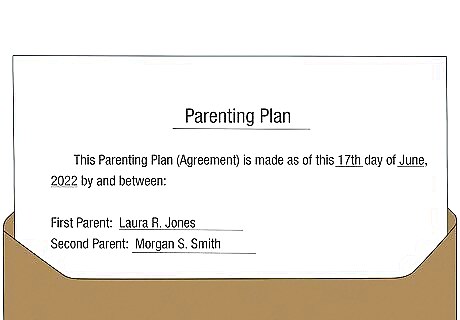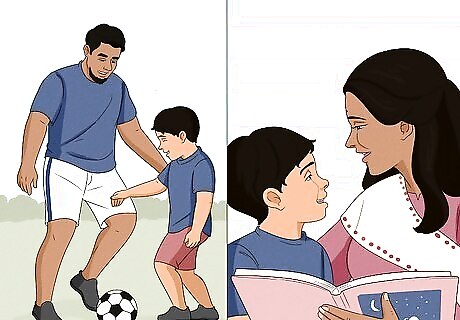
views
Reduce conflict as much as possible.

You can’t win an argument with a narcissist, so disengage from conflict. A narcissist will never allow you to be right, and they can become nasty and hostile when they’re on the losing end of an argument. If your co-parent is picking a fight with you, the best thing to do is leave the situation, even by physically walking out of the room. A narcissist will bad-mouth you to everyone, even your kids—don’t fall for this trap. If you engage them by fighting back, they’ll only use this as ammunition for the future. If your co-parent starts verbally attacking you, say something like, “I disagree with your assessment of me,” and leave the room.
Limit your communication.

Keep communication businesslike to avoid fights. While communication is important in a co-parenting relationship, there’s no need to talk about things unrelated to your kids. Instead of having conversations over the phone, opt for texts, or even better, e-mail. By limiting your exposure to your narcissist co-parent, you can keep yourself emotionally healthy. E-mail is generally the best way to communicate with a narcissist co-parent, since it limits the possibility of communication getting out of hand. Use clear subject lines, like “Soccer game on Friday,” and keep your e-mails brief and to-the-point. For example, send an e-mail to your co-parent that looks something like: “The kids’ soccer game ends at 7 p.m. on Friday. You can take them home after this. Drop them off at my place Sunday night at 9. Thanks!”
Make your boundaries clear.

Narcissists won’t respect boundaries unless you make them explicit. A good approach to setting boundaries with a narcissist is “empathetic confrontation.” Let the narcissist know you see where they’re coming from, then set a boundary. You don’t have to be a doormat: using empathetic confrontation is a great way to stand your ground, while limiting the fallout from the narcissist. For example, you might say something like, “I know that you love spending time with the kids, but it’s an extremely serious matter that you bring them back home on time. If you don’t do this, I’m going to have to report you.”
Set up a detailed schedule in advance.

Setting up a 12-month calendar makes logistics easier. Although it can feel tough planning so far out in advance, write a draft of a calendar that includes information like school breaks, vacation plans, and regular week-to-week parenting schedules and send it to your co-parent to review. Narcissists will often turn logistics into an occasion for fighting, and you can limit these kinds of outbursts by being organized ahead of time. You can do this scheduling work over e-mail. Once your co-parent has approved the draft of your calendar, tell them to print it out or keep a digital copy accessible. If you make updates to the calendar, resend it to your co-parent explaining the changes.
Document everything.

Save all e-mails and texts with your co-parent in case of trouble. If they’re ever late for a drop-off or pick-up appointment, write down the date and time they arrived. This is for the protection of both yourself and your kids if there’s ever a legal dispute. If your co-parent tries to renegotiate your custody agreement, you’ll want to have evidence to dispute their claims. Communicating through e-mails and text make documenting your interactions way easier. It’s far more difficult to document phone calls and in-person meetings, but writing down notes of what happened during these meetings is better than nothing.
Remember your legal agreements.

Your Parenting Plan is a legal order, and should be treated like one. During the court-process for custody, both you and your co-parent will be provided with copies of your legal responsibilities toward your children. If you believe your co-parent has been violating the rules of the Parenting Plan you have deciding parental responsibilities, take another look at the agreement. If your co-parent has not been acting in accordance with the court order, you may have to begin the process of mediation, or speak with a lawyer before filing a claim in court.
Try parallel parenting.

Parallel parenting is an increasingly popular option for families. A narcissistic co-parent can make your life extremely difficult, and if this is the case for you, you might want to change your custody agreement from co-parenting to parallel parenting. Parallel parenting limits the interactions you have with your co-parent, and is a good option if your interactions always lead to conflict. In a parallel parenting arrangement, your kids will live under separate rules depending on whether they are at your home or your ex’s. In addition, you won’t have to attend any of the same meetings or functions as your ex, and can limit your communication to just e-mail.
Care for your children’s emotional health.

Narcissist parents use shame and manipulation to harm their kids. These tactics can really harm their self-esteem and growth, so try your best to supply the kind of love that they might lack from your co-parent. A narcissist co-parent might be overly critical of your kids, or compare them to others in a negative way. Affirm your children’s self-esteem by saying things like: “Great work at school. I know you’re working hard, and for that I’m so proud of you.” “I love you more than anything. You’re a wonderful, unique, and kind person.” “I’m so proud and grateful that I get to be your parent.”
Vent to your friends, not to your kids.

Try your best not to say harmful things about your co-parent to your kids. Your kids are likely to already feel confused and torn between their parents, and showing them signs of conflict like this can make things worse. If you need to vent about your co-parent, talk to other members of your family or your friends instead. You don’t have to speak about your co-parent in positive terms to your kids, but try talking about them in a neutral way, by saying things like: “Your father has had some difficulties, but he loves you a lot.” “Your mom and I have had our differences, but we’re both here for you.” “I know that you and your dad aren’t on the best of terms, and that this is hard. I’m really sorry.”
See a therapist if you’re struggling.

A narcissist might not benefit from a therapist, but you can. Having your boundaries constantly trampled on by a narcissist can exert a serious mental toll on you over time. It’s important that you have a space to vent these feelings, with an audience that isn’t your kids. Schedule an appointment with a therapist so that you can work on overcoming this toxic relationship. Finding a therapist is also a good idea if your kids seem to be struggling. If you’ve noticed your children experience difficult and conflicting emotions due to their relationship with your narcissist co-parent, booking them an appointment with a therapist could really help them process their emotions.
Watch for signs of abuse.

Narcissism can cause aggressive behavior, which can lead to abuse. It’s scary to think about, but if your child displays signs of emotional, physical, or sexual abuse after spending time with your co-parent, it’s important that you act fast to ensure their safety. Please contact Child Protective Services immediately if believe your child’s safety is in danger.



















Comments
0 comment